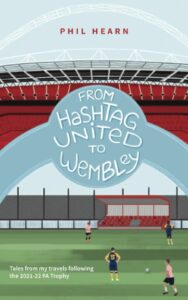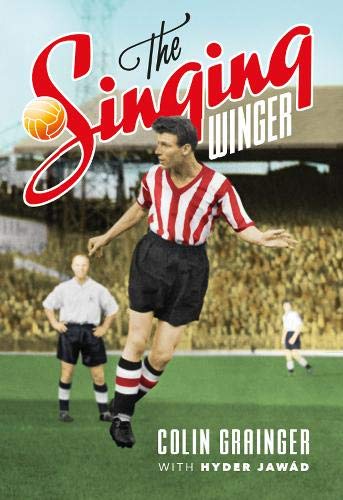Book Review – From Hashtag United to Wembley by Phil Hearn
 Ask people, even those not interested in football, and they will have heard of the FA Cup – the oldest national football competition in the world, which began in 1871. Ask the same group about the FA Trophy and you will no doubt be met with a great number of blank faces. And in explaining to anyone about this competition, like to road to Wembley itself, it can be a tricky task.
Ask people, even those not interested in football, and they will have heard of the FA Cup – the oldest national football competition in the world, which began in 1871. Ask the same group about the FA Trophy and you will no doubt be met with a great number of blank faces. And in explaining to anyone about this competition, like to road to Wembley itself, it can be a tricky task.
When football was in its early days, it was played on an amateur basis, but as professionalism crept into the game there was a desire for an competition just for amateur clubs and so the FA Amateur Cup was born in 1893 and continued until the 1973-74 season when the FA abolished the amateur status. What had also been happening in the game was the rise of clubs paying players who whilst not full-time, could not be considered amateur, since they received regular payment and so were classified as semi-professional. In recognition of this the FA Trophy was created and first played for in 1969-70.
Despite the fact that like the FA Cup the FA Trophy final is played at Wembley Stadium and is the pinnacle for semi-professional players in terms of a national competition, very few books exist about it. Therefore it was a real pleasure to come across Phil Hearn’s From Hashtag United to Wembley.
Hearn’s inspiration came from the book Journey to Wembley The Story of the 1976 – 77 FA Cup Competition and Liverpool’s Bid for the Treble – A Football Odyssey from Tividale to Wembley by Brian James. As a youngster I too remember reading this book and was spellbound by the authors journey to unknown clubs from the Preliminary Round to (the then Twin Towers of) Wembley.
The greatest compliment I can give Hearn’s book is that I enjoyed it as much as James’ book all those years ago. Hearn’s journey as the book title suggests begins with a visit to Hashtag United for their First Round Qualifying (and never call it the First Qualifying Round!) tie with Chipstead in the FA Trophy and ends under the Wembley arch as Wrexham take on Bromley.
What can readers expect along the way? Well, it is part travelogue which has a feel of Bill Bryson about it, with some Victor Meldrew moments as Hearn shares his observations on life and travails, a good sprinkling of football facts, all delivered with humour which at times had me laughing out loud.
It is a real homage to the non-league game, which for the uninitiated is a world of dedicated volunteers, quirky grounds, welcoming clubhouses and where you can still have a drink whilst watching the game. Hearn conveys the pleasures of football at this level, which at the top end contains many ex-league clubs such as Wrexham but also extends to clubs where a crowd of 100 is a bonus.
But the book is not just all about football, and Hearn’s descriptions and observations of the various towns and cities he visits are equally as enjoyable as are his stream of consciousness moments as he travels to and from games, as the country continued to emerge from Covid restrictions.
This is a book that will put a smile on your face and introduce you to a world of football that deserves more exposure. Delve into this book and then get out to your local non-league club.
(Publisher: Independently published. September 2022. Paperback: 333 pages)
Buy the book here: Hashtag United to Wembley

 The 2016/17 FA Cup competition will begin on Saturday 06 August 2016, a fact that will come as a great surprise to those fans within the game who only acknowledge its existence come the Third Round in January.
The 2016/17 FA Cup competition will begin on Saturday 06 August 2016, a fact that will come as a great surprise to those fans within the game who only acknowledge its existence come the Third Round in January.